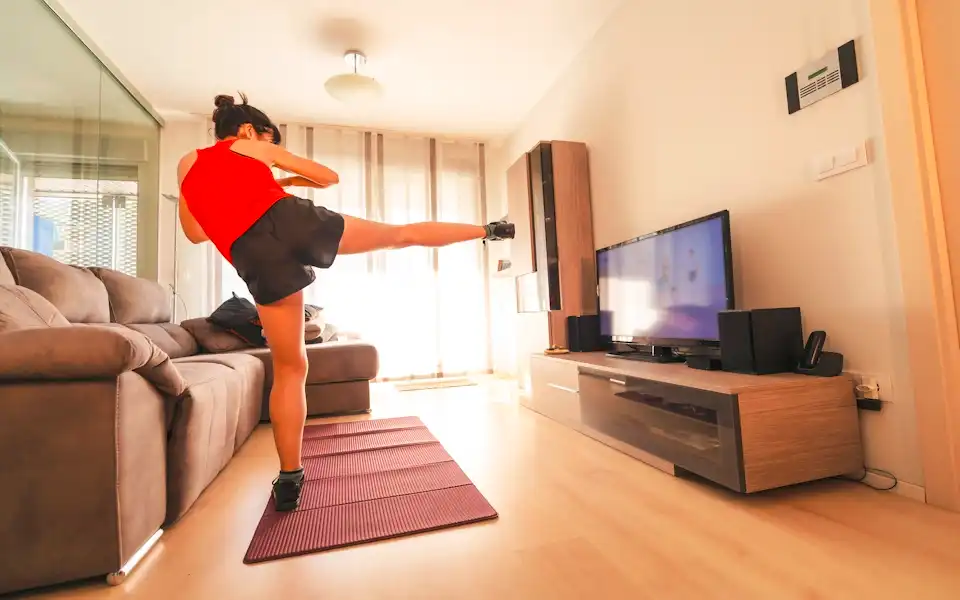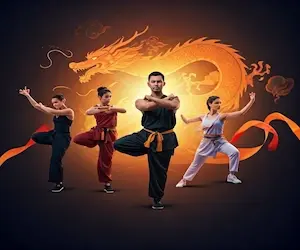Learning martial arts at home appeals more and more. Many individuals want to keep active and develop their self-discipline. Training without leaving your house seems interesting. Still, it presents some challenges. The benefits are obvious, but the difficulties have to be resolved. This article is meant to assist novices in negotiating the realm of martial arts self-training.
Can You Really Learn Martial Arts By Yourself?
Technology has made solo learning much easier and more accessible. You can find videos, apps, and resources online. They cover a variety of martial arts disciplines. But there are limits to what you can learn alone. Expert instructors can help catch mistakes better than self-study.
They have experiences that can accelerate learning. Setting realistic goals ensures that you will not become discouraged. You also need to understand that not all aspects of martial arts are learnable at home. Flexibility and discipline are key.
You can train on your schedule. This makes martial arts perfect for those with busy lives. You get to learn at your own pace without pressure from others. Self-training is also much cheaper compared to classes.
You do not need to spend money on expensive lessons. It provides you to tailor your practice to suit your needs. For some, training alone also becomes a way to self-reflect. Personalizing your journey can be very rewarding.
One big issue with home training is the lack of immediate instruction. Without a teacher, mistakes go unnoticed. Practicing techniques that need a partner, like grappling, is very hard alone.
You could develop bad form without knowing it. Martial arts require precision and focus. Training without feedback might hinder growth. Knowing how to address these challenges is important for long-term progress in learning.
Getting Started: What You Need To Begin Training At Home
Some martial arts are better suited for individual practice. Tai Chi is ideal for mindful movements. Karate is great for strong techniques. You might prefer Kickboxing if you want a good workout.
Your goals should help you choose. Are you looking for better fitness or self-defense? Also, consider your fitness level and space available. Body weight and experience also help decide your training path.
You need proper gear to start safely. Comfortable clothes that allow movement are important. Training mats are helpful if you practice on a hard surface. Having a safe area to train prevents unnecessary injuries.
Punching bags lets you practice with force. If you cannot afford one, pillows can be substitutes. Purchase focus mitts to work on accuracy. These basic items help you perform better solo techniques at home.
Video tutorials are very helpful when starting martial arts. Look for high-quality content with clear instructions. Many online courses are designed for beginners. The best ones will guide you step by step.
Training apps are also useful for tracking consistency. Martial arts YouTube channels are popular for solo learners. Joining online forums gives you a learning community. They give tips to keep improving even at home.
Core Skills To Focus On As A Beginner
Before attempting advanced movements, learn the basics. Start with foundational stances for balance. Practice punches like jabs and hooks. Work on front kicks and blocks.
Shadowboxing allows you to train by imagining opponents. Repeating drills builds confidence and clearer execution. Pay attention to your form and breathing.
Stretching helps prevent injuries. Warm-up routines increase your flexibility. Without balance, techniques will lack sharpness.
Coordination drills improve reaction timing. Engage in simple bodyweight exercises for strength. Try planks or squats to support your martial movements. These small steps give big long-term benefits.
Staying disciplined is tricky when training alone. Set measurable goals to keep your focus strong. Short-term goals like mastering one punch help track progress easily.
Avoid skipping days to train. Keep a journal to record improvements. This helps you reflect and adapt over time. Motivation increases with consistent effort in training.
Practicing Safely And Effectively
Safety should always come first. Learn proper form before increasing speed or power. Doing too much too soon leads to overtraining. This raises the risk of physical injury.
If an injury occurs, stop and rest. Ignoring pain can cause long-term harm. Gradual progression keeps your body safe while learning new skills.
Feedback helps refine your style. Use mirrors to watch your movements carefully. Record videos of your practice to catch errors. Watching yourself from another angle is eye-opening.
Join online martial arts communities for advice. Others can give detailed critiques to help improve. Consider investing in virtual coaching. Occasional lessons add fresh insight for self-learners.
FAQs About Learning Martial Arts At Home
Is It Effective To Train Alone Long-term?
Yes, solo training can stay effective for many years. It depends on consistency and good guidance materials. The learning curve is slower compared to formal settings.
How Often Should You Practice Martial Arts At Home?
Beginners should start with three or four days per week. This builds muscle memory without overburdening you. Track your sessions and aim for gradual improvement.
What Are The Easiest Martial Arts To Learn At Home?
Tai Chi is beginner-friendly due to its slow pace. Kickboxing offers simple combinations. Karate focuses on clear and structured techniques. Pick one based on your goals and body ability.
What Are The Signs You Are Ready For Professional Training?
When you master the basics independently, you might feel limited. If advanced techniques interest you, then joining a formal class makes sense. Learning with experienced instructors is beneficial.
Conclusion
Self-training in martial arts at home is achievable. You have resources online to guide basic techniques. However, challenges like lack of feedback must be addressed. Gradual and consistent practice brings long-term benefits. Build discipline and keep improving even in small steps. Martial arts is a rewarding journey.

Gas S. is a health writer who covers metabolic health, longevity science, and functional physiology. He breaks down research into clear, usable takeaways for long-term health and recovery. His work focuses on how the body works, progress tracking, and changes you can stick with. Every article is reviewed independently for accuracy and readability.
- Medical Disclaimer: This content is for education only. It doesn’t diagnose, treat, or replace medical care from a licensed professional. Read our full Medical Disclaimer here.



